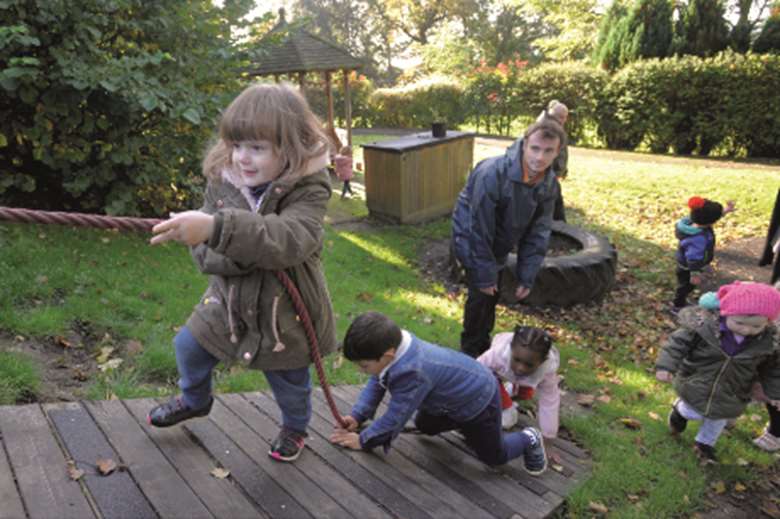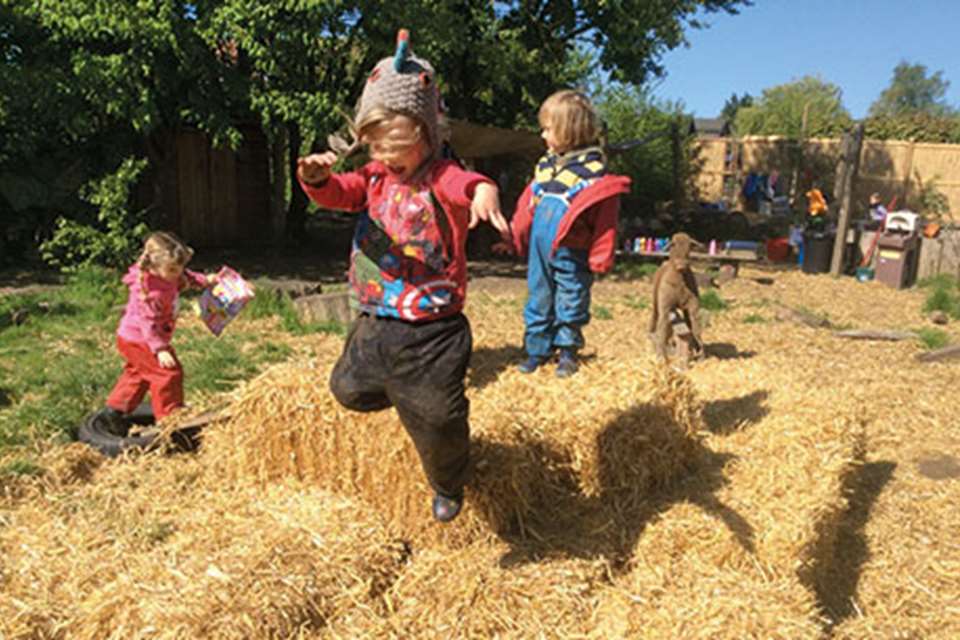Nursery of the Year 2019 - Up close
Nicole Weinstein
Monday, October 28, 2019
At award-winning Spring Bensham, every effort is made to ensure a feeling of belonging, discovers Nicole Weinstein

With more than 70 three- to five-year-olds from two different providers sharing the same room, outdoor area and teachers, getting to know each child intimately is a challenge. However, it is one that Nursery World’s Nursery of the Year is able to meet through a ‘highly sophisticated’ model of good practice that ‘works seamlessly’, according to Nursery World Awards chief judge Wendy Scott.
Spring Bensham, an Outstanding 55-place setting, shares its premises with Bensham Grove Community Nursery School, which is based in Gateshead, Tyne and Wear and offers sessions to up to 54 children, morning and afternoon.
The building has a large open space downstairs, which opens out onto a well-designed garden that the children can access freely. Upstairs are nursery children aged from six months to three years. The three-year-olds then access a school place in the term after their third birthday and join the other three- to five-year-olds in the space below.
There, the school delivers 15 funded hours, while Spring Bensham provides the extended 15 hours of the 30-hour entitlement flexibly for working parents, along with full wrap-around care, from 7.30am to 6pm all year round.
Currently, up to 34 three to fives a day access the additional hours at Bensham, but numbers increase with each termly intake, rising to about 60 in the summer term.
‘It’s a pretty unique challenge when it comes to continuity of care,’ explains manager Helen Bowlby, who has been at Spring Bensham since 2015. ‘It’s not obvious to the children because they don’t change rooms, but effectively they are being cared for by two different providers under one roof.’
Many of the children are vulnerable or have complex special needs, yet the transition, which is tailored to each individual child, is seamless and works so efficiently because staff are ‘so well-integrated’ and ‘entirely focused on the children and families they care for’, explains Ms Scott.
‘The keyworker attends parents’ evenings and reflection meetings with the school staff and together they are involved in planning for the children’s interests,’ she adds. ‘There are no barriers; it’s a mutually supportive environment and staff morale is high. This creates a powerful sense of belonging, which in turn filters down to the children and families.’

LITTLE BY LITTLE
Such is the level of care and attention from the staff that some parents view the practitioners as ‘extended family’, Mrs Bowlby says. ‘We’re in a very deprived area and some parents have had such poor experiences of education that it’s a challenge to even get them to attend. One parent trembled at the door for months.
‘But we invite them in and we build a relationship with them, starting with a home visit. We also support a lot of parents and carers in getting back to work or education and we are on hand to offer parenting support.’
With 18 languages spoken at the nursery, language and cultural differences are also given careful consideration. ‘Some children are carried in a sling for most of the day and breast-fed on demand, so it’s a huge challenge to get them on the ground playing, let alone be separated from their mother,’ Mrs Bowlby explains.
The settling-in process is tailored to each child. One child with additional languages recently spent three weeks coming into the setting for ten minutes a day until she was settled enough to stay on her own.
Children with SEND are also exceptionally well catered for and Nursery World judges praised them for their ‘outstanding’ SENCo team, and the way they had formed well-established links with other specialists (see Case study).
‘The most important thing we can do is to make sure we’re looking at each person individually, parent or child. What works for one doesn’t necessarily work for another,’ Ms Bowlby says.

HOME FROM HOME
Relationships between children and staff were described as ‘exceptional’ by Ofsted in its 2018 report. The journey begins with a home visit from two members of staff: the child’s keyworker and either a room practitioner or a nursery teacher.
Mrs Bowlby says, ‘This is an opportunity to gain insight into the child’s family, background and culture and allows them to be seen in the environment in which they feel the most comfortable. The keyperson then builds on this relationship, supporting the child through developmental milestones and family life experiences and involving the child’s parents and carers in their nursery life, forming an extension of home.’
Intricate knowledge of the child’s development is sought, nurtured and shared with parents through observations, daily informal chats and one-to-one meetings. Parents are also invited to regular stay-and-play sessions, to read stories, paint and bake with the children.
‘It’s crucial for the child to see that we have a trusting relationship with their family in order to feel empowered, confident to explore their learning environment and to have a go,’ Ms Bowlby explains.

ALL ABOUT ME
The high level of awareness of keyworkers and recognition of the prime importance of the adult-child bond is also evident throughout the nursery environment. Photo frames with images of children and their families are dotted around the setting and children have their own pegs and trays where they can place photos or familiar objects.
‘It’s important that they know that this is their space; they are part of the nursery and they are valued and included,’ Ms Bowlby says.
The setting has also developed the Me, My World, My Family approach to further develop the link with families. Until recently, this was in the form of a book that parents could take home and add to, for example, photos, pictures their child had drawn, leaflets or bus tickets from days out, or simply write about their experiences at home. It has now been superseded by online nursery management system Famly, where parents add photos and comments of special achievements or family events.
‘This is a great tool that can be shared between the child and keyperson on either on a one- to-one basis or as a small group. It gives children a sense of belonging, sharing their own experiences and being given time to feel valued,’ Ms Bowlby concludes.
case study: PRADER WILLI SYNDROME
Sixteen-month-old Andrew (name changed), who started at Spring Bensham last September, has Prader Willi syndrome. This rare genetic condition causes a wide range of physical symptoms, learning difficulties and behavioural problems and was a huge concern for his parents when his mother, Leigh, had to return to work.
She says, ‘Staff were warm, welcoming and although they had never heard of the condition, they were so keen to learn. They worked in partnership with us to ensure his needs were met to the highest standard. Meetings with various team members were held, including the chef, to devise a special menu tailored to his restrictive diet.
‘The bond between Andrew and his key worker is so comforting for a parent to see. He’s not able to speak or cry but can recognise changes and respond appropriately. Makaton is used throughout the nursery with all of the children and many of the staff have been on training programmes for this.
‘He has regular physio and portage appointments held at nursery which they facilitate and work closely alongside. They have always been inclusive and adapted to Andrew’s needs accordingly to ensure he is involved in all activities with his peers.
‘I truly believe the nursery has been a big part of his development. As a parent of a child with additional needs it’s wonderful to see how much he loves being there and how much they are nurturing him to grow and develop. It’s evident that this is an outstanding nursery that ensures equality of opportunity for all children.’
ABOUT SPRING BENSHAM
Spring Bensham, part of Action for Children’s Spring group of nurseries, employs 16 members of staff.
The manager has a degree in primary education with QTS and EYT; three staff members hold early years qualifications at Level 6; nine hold early years qualifications at Level 3, and two are apprentices.
Bensham was owned by 4Children, whose nurseries were acquired by Action For Children in 2016 and rebranded Spring in 2017. The charity also operates 249 Children’s Centres.
MORE INFORMATION
Download Now






